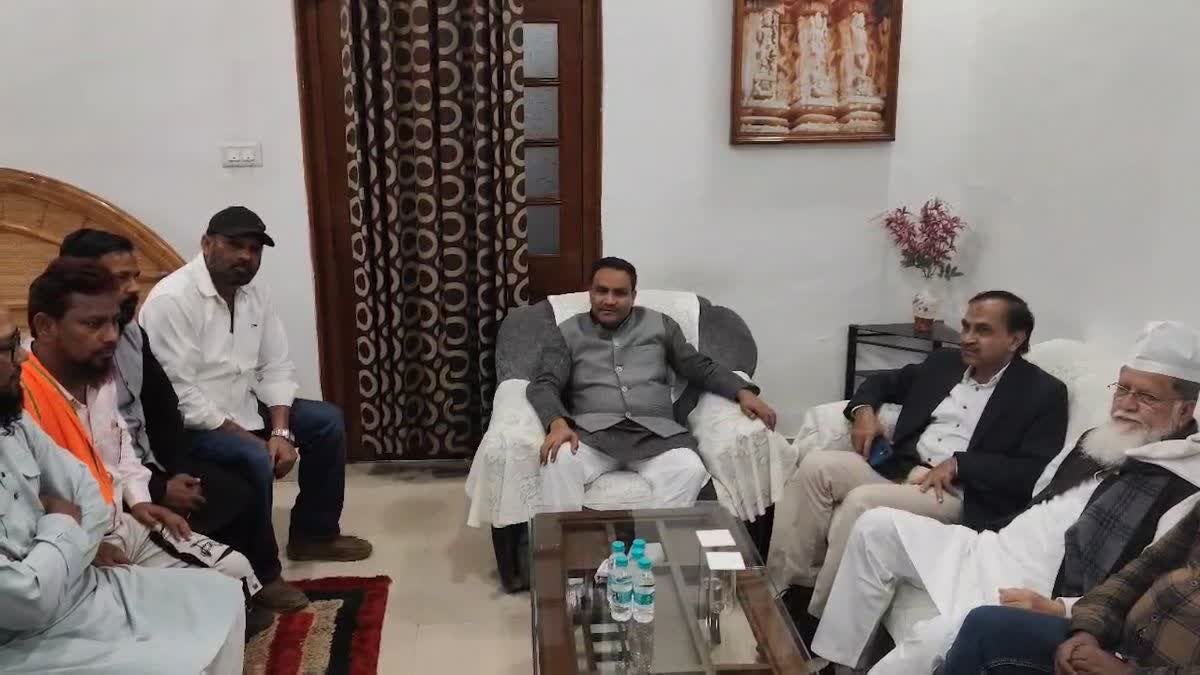
Mandakini Mishra/Raipur
In recent years, there are hardly any leaders who have taken a stand for the rights and welfare of the muslims in Chhattisgarh as Dr Salim Raj.
A long-time member of the Bharatiya Janata Party, Raj today serves as the chairman of the Chhattisgarh Waqf Board, a position that carries the rank of a cabinet minister.
His rise is not just a story of political success but of an individual determined to transform religious institutions from centres of dispute into engines of social and national development.
As he often says, “Religious institutions should not be centres of controversy but partners in the country’s progress.”
.jpeg) Dr. Salim Raj being felicitated
Dr. Salim Raj being felicitated
Dr. Raj’s journey began in 1992 when he joined the BJP, at a time when minority leaders in the party were rare and often faced suspicion from within their own communities.
Over the decades he rose steadily through the ranks, serving at the district, state and national levels in the BJP Minority Morcha. Between 2016 and 2020, he chaired the party’s state Minority Morcha, building a reputation for outreach and consensus.
This experience laid the groundwork for his current role as the head of the state Waqf Board, where he has emerged as a reformist leader with a rare mix of administrative focus and grassroots credibility.
When he assumed charge of the Waqf Board, Dr. Raj made it clear that his tenure would be defined by transparency and accountability. One of his first announcements was a sweeping campaign to free Waqf properties from encroachment.
.jpeg)
According to his estimates, nearly 85 per cent of these properties were under illegal occupation — a staggering figure that had drained the Board of resources and credibility. His plan was not only to reclaim these assets but to repurpose them for education and social service, turning dormant properties into active resources for the community’s good.
Just as striking was his intervention in the area of marriage customs. Concerned about the financial pressures on poor Muslim families, Dr Raj issued a directive capping the fee that clerics could charge for solemnising a nikah at ₹1,100.
This move, simple on the surface, had a profound social impact: it reduced the economic burden of marriage ceremonies, made them more accessible to low-income families. By curbing excessive fees and promoting transparency, Raj showed that administrative measures could directly improve the everyday lives of ordinary people.
He also took on a sensitive but long-standing problem: the use of inflammatory political rhetoric from religious pulpits. Under his leadership, the Waqf Board introduced guidelines requiring that Friday sermons (jumma takreers) be based on pre-approved themes.
The goal was not to stifle religious discourse but to ensure that mosques served as platforms for social harmony and religious education rather than sectarian conflict. This decision attracted both praise and anger, with Raj receiving threats — even from abroad — after issuing his orders.
Yet instead of retreating, he accelerated his reform agenda, convinced that religious institutions could only gain respect if they were not in conflict with the larger social responsibility and national interests.
Another of his headline-grabbing decisions was to direct that the national flag be hoisted at every mosque on Independence Day. “A mosque that does not hoist the tricolour risks treating itself as separate from the nation,” he declared.
For Raj, nationalism and faith are not opposites but complementary forces that must be woven together — an idea he describes as “true secularism.”
He has repeatedly argued that mosques that do not run educational activities should step forward to teach children, thereby contributing to nation-building.
In his view, Waqf properties should be mobilised to expand education and social welfare, and unused assets should be activated rather than left idle.
These measures have brought Raj both admiration and criticism. Supporters see him as a courageous reformer willing to challenge entrenched interests; detractors accuse him of overreach.
.jpeg) Dr Salim Raj in BJP office
Dr Salim Raj in BJP office
But the results speak for themselves. His emphasis on constructive sermons and community education has helped reduce communal tensions and foster a climate of dialogue. Festivals and religious events are increasingly celebrated with a spirit of inclusion rather than confrontation.
Under his watch, the Waqf Board has also begun surveying its properties and rationalising rents — a step that not only regularises income but also prevents misuse.
Several inactive properties have been reactivated, leading to a measurable increase in the Board’s revenues. Raj welcomed the recent amendments to the Waqf Act, calling them “historic” and predicting that they would ensure greater security and transparency for Waqf properties.
In his words, the new legal framework will benefit the community for years to come and make the Board’s operations more systematic.
Yet for Dr. Salim Raj, reform is not just about numbers; it is about reimagining the role of religious institutions in a modern society. He often says that if religious resources are linked to education, health and social upliftment, they can strengthen the nation as well as the community.
This vision underpins his campaign to reclaim encroached Waqf properties and repurpose them for public benefit. According to his own figures, about 85 per cent of such properties have already been freed from illegal occupation under his initiative.
These assets are now being channelled into schools, hospitals and employment-generation programmes, bringing tangible benefits to people who had previously seen Waqf lands as distant or mismanaged.
Raj’s ultimate goal is to transform the Waqf Board from a purely religious body into a resource hub for education, healthcare and employment. He wants Waqf properties to become instruments of poverty alleviation and youth empowerment.
In his speeches he often emphasises that religious institutions should not confine themselves to rituals alone but should actively participate in the country’s progress. By advocating this approach, he has not only reshaped the Muslim community’s expectations but also challenged other faith-based bodies to rethink their own social responsibilities.
Behind his policies lies a blend of political strategy and moral conviction. Having spent decades inside the BJP, Dr. Raj understands the workings of government as well as the sensitivities of minority communities.
This dual insight allows him to navigate the tricky terrain of reform without losing sight of his broader mission. His critics may question his methods, but few deny that he has put the Chhattisgarh Waqf Board on a new footing.
He also frames his work as part of a larger idea of “true secularism” — one that connects patriotism with all religions rather than setting them apart. In Raj’s vision, religious institutions should help children gain education, inculcate a sense of citizenship, and encourage constructive social attitudes.
By steering Waqf resources towards schools and training centres, he hopes to equip a new generation with the tools to participate in national development rather than remain on the margins.
 Salim Raj in his office
Salim Raj in his office
The results are already visible. Under his leadership, community tensions have eased, Friday sermons have become more focused on ethics and civic duty, and more Waqf properties are being used to run educational and healthcare initiatives.
The Board’s income has increased, and its reputation has improved. Raj’s insistence on hoisting the tricolour at mosques has symbolically reinforced the idea that faith and nationhood can coexist with dignity.
Still, his path has not been easy. Each reform has met resistance — from clerics opposed to the nikah fee cap to entrenched interests benefiting from encroached properties. The threats he received, including those from abroad, are a testament to the risks of challenging old structures. Yet Raj has remained undeterred, viewing opposition as proof of the necessity of his reforms.
What sets Dr Salim Raj apart is not only his administrative drive but his ability to articulate a broader purpose. He presents himself not just as a politician but as a reformer determined to leave behind stronger institutions.
This principle underlies every initiative he has launched — from freeing Waqf properties to capping nikah fees, from regulating sermons to insisting on the national flag. In doing so, he has created a model of how tradition can be reconciled with transparency and how faith can support rather than hinder social reform.
Today, Dr Salim Raj is widely regarded as both a shrewd political strategist and a visionary reformer. His policies have strengthened not only the Muslim community but also the social and economic fabric of Chhattisgarh as a whole. Whether reclaiming properties, improving education, or promoting communal harmony, he has consistently sought to align religious resources with public good.
ALSO READ: Dr. Abbas Naqvi's medicine is mixed with compassion and human touch
For Chhattisgarh, and perhaps for India as a whole, Dr. Salim Raj’s experiment offers a glimpse of a future where faith and reform move hand in hand — a future in which religious endowments are no longer passive relics but active contributors to national progress.
